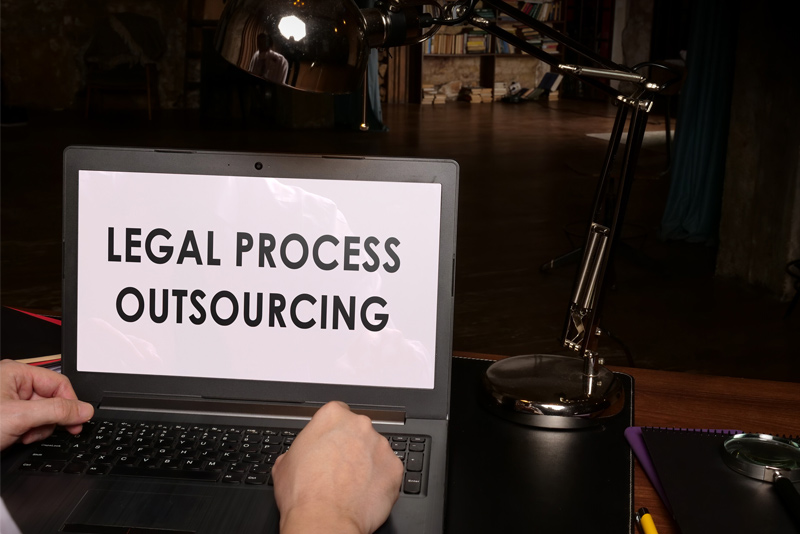The requirements for functional and business support procedures in service delivery have grown along with businesses’ evolution and complexity. Corporate legal expenditures are skyrocketing due to rising litigation and regulatory expenses; consequently, businesses are looking for ways to cut legal spend and are putting pressure on their legal departments to find more effective and efficient ways to do their jobs. This is why corporate legal departments are turning more and more to legal process outsourcing services to ease these worries. When putting an LPO solution into place, corporate legal departments must decide when is the best time to do so as well as which areas to outsource. When implemented properly, a comprehensive legal service delivery transformation approach integrating LPO can have a significant impact on the problems corporate legal departments are facing.
Challenges Faced by Corporate Legal Service Departments
Before implementing legal process outsourcing, it is important to identify the challenges faced by corporate legal departments. There are a number of issues, and the major challenges are:
-
- People:
- Resource allocation: Corporate legal service departments are looking for ways to provide more legal services with minimal resources and evaluating an effective mix of attorneys to staff.
- Process:
- Project management: Corporate legal departments are struggling to develop a strong corporate project management capability and the tools that are necessary to manage the projects.
- Project improvement: They are facing increased inefficiency in processes such as contract management and intellectual property (IP) management.
- Technology:
- Automation: Today, several corporate level departments lack automation and integrated technology solutions in areas such as matter management, billing and contract management, further draining costs and resources.
- Document standardization: When it comes to transactional area, corporate legal departments are facing the problem of lack of standardization in terms of contracts. This can increase costs and time associated with transactional lifecycle.
- Build vs technology: Now, there is rising need for technology and tools to streamline various legal processes. Companies have to meet the challenge of developing such tools in-house, or choose to outsource the work to an external provider with the right technology solutions.
- People:
Which Legal Processes Can Be Outsourced?
Companies should first consider whether outsourcing will compromise the legal department’s ability to establish and execute business strategies related to that service. Over the years, the market for outsourcing legal processes has grown beyond transaction-based legal processes to higher level capabilities, such as contract drafting and IP. There are mainly two areas of services that can outsourced:
-
-
- Core Services: Corporate legal departments may consider internal legal SDT options like shared services or internal technology enhancements for “core” legal services. For example, services such as corporate legal representation, mergers and acquisitions activities. In the case of legal processes considered as core services, specific components can be outsourced. Even though patents and trademarks are example of core processes, there may be transactional elements within these processes that can outsourced.
- Non-core Services: Legal departments may consider outsourcing non-core transactional services like document review, contract/IP management, and paralegal support. When doing this, legal departments should identify whether these functions are mature enough for such a transition. For legal services that are considered as non- core services, outsourcing legal process can minimize cost and increase resources.
-
It is important to identify the most important areas that would benefit from standardization of your legal departments. The most commonly outsourced legal processes are:
Research: Legal research and drafting, pre-compliance monitoring, compliance implementation, and multi-jurisdiction risk assessment surveys.
IT and Administration: Data collection and extraction, data entry, information management, billing, and legal eDiscovery processes.
Contracts: Legal contract lifecycle management, from creation and negotiation through execution and approval.
5 Legal Processes Commonly Outsourced in Corporate Legal Support
Legal processes are usually divided into five different sections and the processes within each category that are most commonly outsourced are:
-
-
- Administrative Support: Data extraction and entry, electronic document management; secretarial services, billing services and paralegal services
- Intellectual Property: Patent drafting and review, IP portfolio management, patent proofing and docketing, cease and desist notices
- Litigation Support: Document discovery; e-discovery compliance; database creation and maintenance
- Legal Research & Analysis: Statutory or case law research; legal coding and indexing
- Contracting Support: Contract due diligence; contract management
-
Best Practices for Successful Legal Process Outsourcing
-
-
- Clearly state your expectations and aims: You should be very clear about the goals you have for outsourcing your legal work before you begin searching for an LPO provider. Which goals are you pursuing—cost savings, enhanced quality, more capacity, or access to specialist skills? What particular demands do you have for the work that is being outsourced? How are you going to assess the LPO project’s success? Finding the appropriate provider for your needs and averting misunderstandings and disputes later on are made possible by having a clear grasp of the goals and parameters of your project.
- Make sure you have done your research about the service: After you’ve narrowed down your list of possible LPO providers, you should thoroughly investigate each one to confirm their qualifications, standing, expertise, and skills. Examine their case studies, references, endorsements, and examples of their work. Additionally, you want to go over their rules and processes, meet the staff, and tour their premises. Concerning their quality standards, security protocols, data security, compliance, and ethical practices, you ought to question them. Additionally, you want to assess their approaches for communication, delivery, and price. A provider that fits your requirements and is consistent with your culture and values is the one you should select.
- Work out a detailed and clear contract: Once a provider has been chosen, you should negotiate a precise and all-inclusive contract that addresses every facet of the LPO project. The scope, deliverables, deadlines, milestones, payment terms, reporting procedures, performance indicators, quality standards, dispute resolution, confidentiality, intellectual property, and termination clauses should all be included in the contract. The contract should also outline the parties’ respective duties and obligations, as well as the routes of communication, escalation protocols, and change management methods. Both parties should evaluate and sign the contract, which should be sufficiently flexible to account for any unforeseen circumstances or changes that may occur throughout the LPO project.
- Create a solid management and governance framework: Establishing a solid governance and management structure that supervises and synchronizes the outsourced work is essential for a successful LPO project. As the primary point of contact with the provider, you should designate a dedicated project manager or team leader who will oversee and manage the timeliness, effectiveness, and quality of the outsourced work. Involve the pertinent parties in the LPO project, such as the clients, the lawyers, and the regulators, and make sure they are informed and involved at every stage. Along with setting up routine review and feedback meetings with the LPO provider, you should also swiftly and constructively handle any problems or complaints that arise.
- Take advantage of legal process outsourcing advantages and chances: Lastly, you ought to take advantage of the chances that outsourcing of legal process can provide for your legal business. You should optimize your legal operations and concentrate on your core capabilities and strategic goals by utilizing the cost reductions, quality improvement, capacity enhancement, and skill access that LPO can offer. Additionally, you ought to take advantage of the LPO project as a chance for learning and creativity, investigating fresh approaches to provide legal services to both your clientele and the community. A long-lasting, mutually beneficial partnership should be established between you and your LPO supplier, with the goal of generating value and synergy for both.
-
Implementing a corporate legal process outsourcing strategy involves careful planning, clear communication, and choosing the right partner. By defining legal needs, setting performance metrics, and focusing on data security, companies can leverage legal process outsourcing services to reduce costs, improve efficiency, and maintain compliance.




